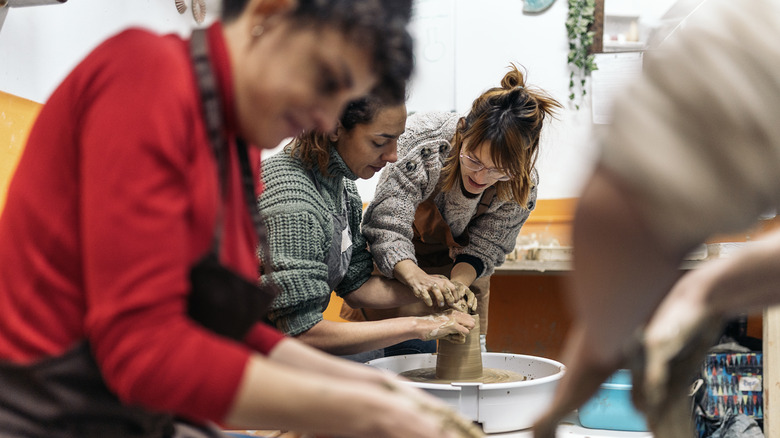Tips On Feeling Confident While Sober (Because You Don't Always Need Liquid Courage)
Sure, margaritas and Long Island Iced Teas taste good, but the reasons people sip on alcoholic drinks often extend far beyond flavor. A 1993 study published in the journal Addictive Behaviors pinpointed two common motives for imbibing: to lower stress and boost sociability. If you've ever thrown back a drink (or a few) with your pals, you're likely familiar with the feeling of liquid courage. According to GoodRx, alcohol floods the brain with dopamine while impairing the prefrontal cortex. This results in a feeling of euphoric confidence paired with lowered inhibitions.
Once you've learned to socialize with a drink always in hand, it can be a little nerve-wracking going on a first date or attending a wedding stone-cold sober. You may wonder, "Will I still be funny without downing a shot first?" or, "Will I be fun to be around if I don't drink?" The answer: yes and yes. Use these tips to ooze confidence, no liquid courage required.
Identify what you bring to the table
Are you known for being The Happy Drunk or The Risk-Taking Drunk? Though your drunk archetype may have brought you confidence before, you don't need it to feel self-assured now. Instead, consider stepping into a new role when out socializing.
Dr. Tchiki Davis, founder and president of the Berkeley Well-Being Institute, writes on Psychology Today that understanding your strengths is a crucial part of feeling confident. She notes that everyone has good qualities, though focusing on your shortcomings or insecurities may distract you from them. Reflect on your best qualities and what makes you a great friend to hang out with.
When going sober, you might also feel confident fully embracing your position as the responsible, clear-headed one. "Some people do find a positive role in [transforming themselves from the drinking buddy to the designated driver]," Dr. Mark Willenbring, former director of the division of treatment and recovery research at the National Institute on Alcohol Abuse and Alcoholism, shared with WebMD. "The group can accept them in a different way; they don't have to expel them."
Change up your squad
There are numerous reasons to abstain from alcohol. Maybe you're tired of dealing with hangovers or you want to protect your mental health. No matter why you're sober, it's a completely valid choice that no one should get in the way of — including your friends.
If you have people in your life who you feel uncomfortable around, especially without the help of alcohol, or if your friends pressure you to drink, it might be time to distance yourself from them. A good friend will make you feel supported and respected, without either of you needing alcohol as a social lubricant.
Prosperity Haven, a treatment center for substance addiction, says that it's totally okay to cut out friends or loved ones who try to derail your sobriety. Still, you don't need to isolate yourself. Seek out other sober people or friends who don't mind meeting at lunch instead of happy hour. Eliminating unnecessary toxicity will help protect your peace and keep your confidence intact.
Accept awkwardness in the beginning
Like riding a bike without training wheels for the first time, socializing without liquid courage can feel awkward — and even scary — in the beginning. So if you don't feel super confident and at ease the first few times you go out sober, don't fret. Instead, see awkwardness as a good thing. Healthline explains that fumbling in social situations can actually help you learn to better respond to social cues in the future. Awkwardness may also signal that you're skilled at creating deep connections, rather than superficial small talk, and that you observe things from a different perspective than others.
Even if awkwardness can be beneficial, it's not necessarily comfortable. Still, it doesn't have to ruin your night, says Donna Cornett, founder and director of the Drink/Link Moderate Drinking Program. She told WebMD, "Before you get there, say, 'I am going to feel awkward.' That kind of takes the edge off of the anxiety and temptation." Put on your best outfit and listen to some upbeat music before you leave home. Then, when you're out and feeling uneasy, take a deep breath, maintain a tall posture (which is scientifically proven to increase confidence), and let the rest go.
Explore new social activities
Your social life can take a hit when you're sober, especially if your friends tend to bond over beers at the bar and Bloody Marys at brunch. If your confidence is rattled at the thought of sipping sodas while your crew gets tipsy, eliminate alcohol from the picture altogether when possible.
"If your social group is built around drinking it can be hard to gain acceptance for a behavior not practiced by the group," John Mendelson, professor at the University of California at San Francisco and clinical addiction expert, told Vice. "For people contemplating a sober lifestyle they will likely need to develop new peer groups and activities. They are there—all you need to do is find them."
Consider the interests and hobbies you share with your friends that don't involve drinking. Maybe you and your BFF have always wanted to try bouldering, or perhaps you can suggest a morning pottery class to your Sunday brunch group. Creative or athletic activities can be especially effective at relieving any sober jitters because the focus is on the shared experience — not on saying the "right" thing or acting the "right" way.
Ask for help
Staying sober can be a healthy choice for both your physical and mental health, but it can also expose the insecurities and struggles that alcohol masked. As Gateway Foundation explains, alcohol misuse is often correlated with low self-worth. When you don't feel good about yourself, you might turn to drinking to feel more confident and at ease. But remember that liquid courage isn't true confidence.
Feeling comfortable and self-assured while sober is possible, though it can take a bit of work in the beginning. "There are many ways to build self-confidence," Rameya Shanmugavelayutham, a licensed clinical social worker, revealed to MindBodyGreen. "One approach involves processing and uprooting the formative experiences that may have contributed to a negative sense of self. While this can be done through personal reflection and journaling, it can often be more effective when done in relationship with a safe support person such as a therapist."
Find a mental health professional who can help you work through self-doubt and self-esteem issues. Additionally, reach out to trusted friends about what you're going through. A solid support system can hype you up on those first sober nights out.





